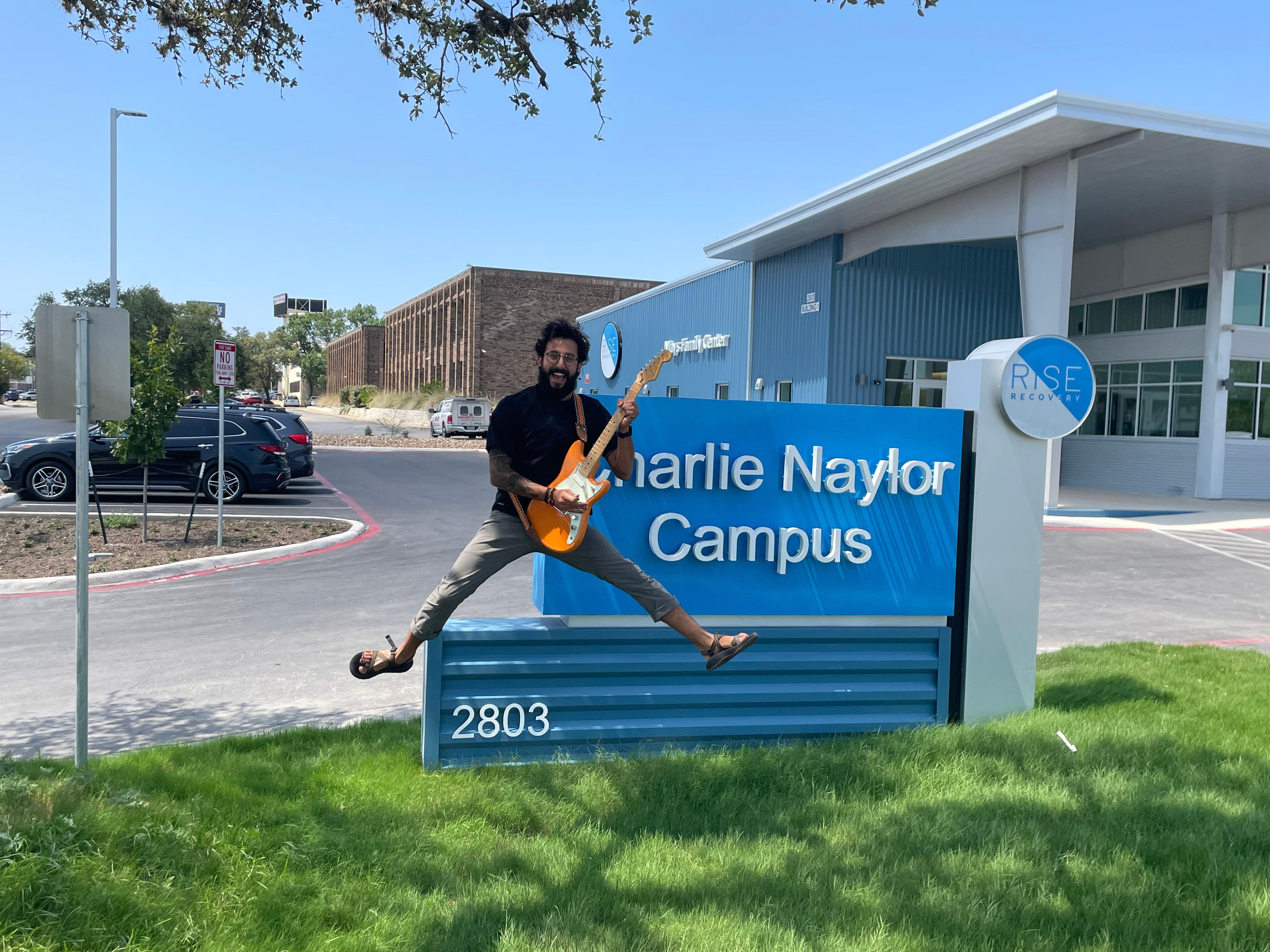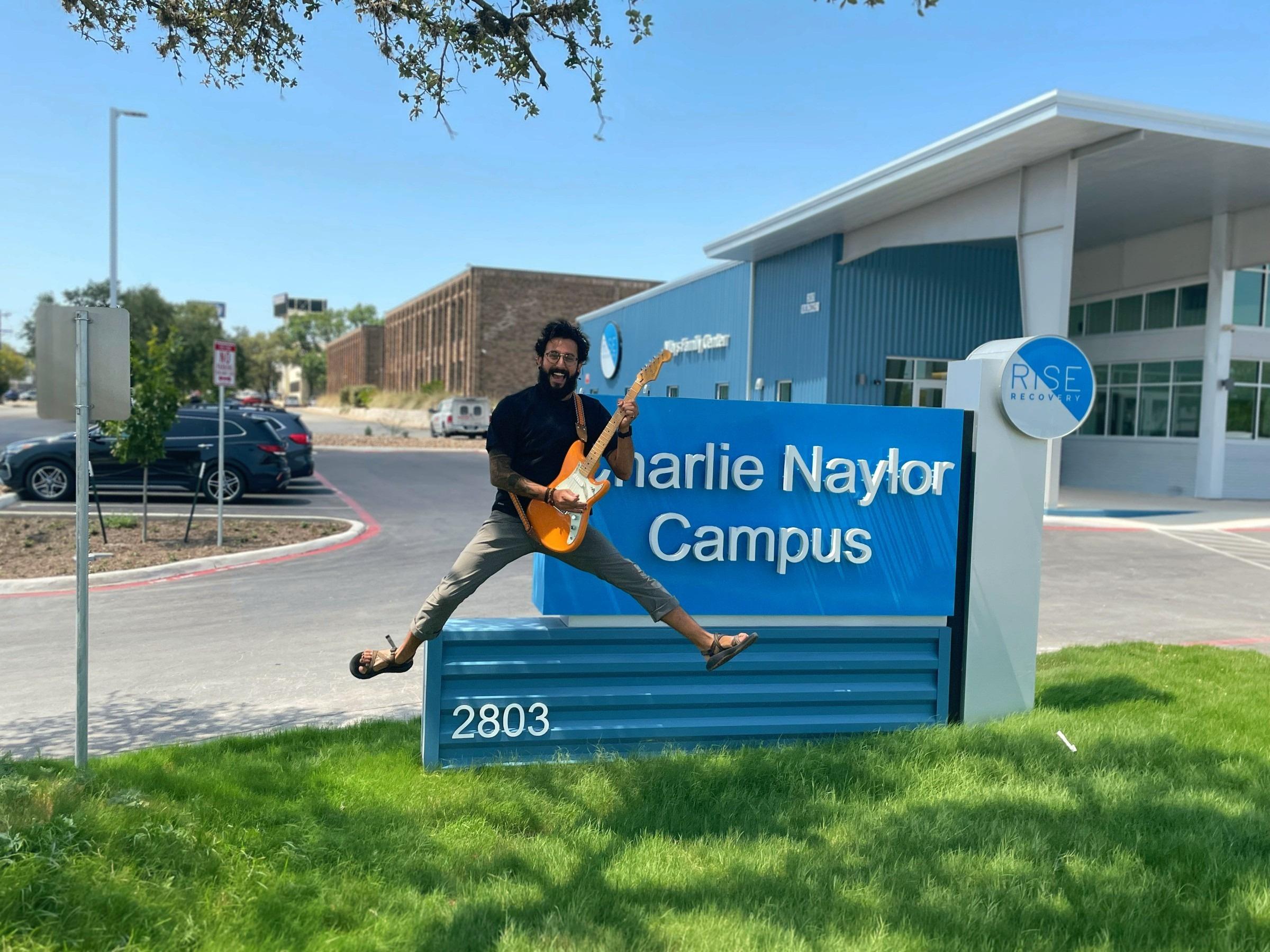sister sister sister sister







power
Recovery
A look back at
The Rise Recovery team starts a two year training journey to ensure a trauma informed approach to recovery support.
Triston might not describe himself as a super hero despite his gravity defying abilities. However, the children he serves at San Antonio Independent School District through Rise Recovery's Y.E.S. Program would disagree.

Y E S stands for Youth Empowered by Sobriety and has been in place for over a decade in area schools The program gives young people in recovery the tools they need to cope with life's stressors and teaches them how to be leaders in the recovery community Students attending Y E S meetings tend to avoid
relapse and receive fewer disciplinary referrals due to substance possession or use
The rest of Triston's professional time is spent facilitating youth group meetings at Rise Recovery's Charlie Naylor Campus as well as sober social activities offsite When he's off the clock, Triston plays various musical instruments, meditates and...flies?
enjoy guided meditation,

Recovery's
of
Welcome to The Knot, Rise Recovery’s special publication aimed at providing deeper resources and connection to our supporters. As you read this, know it was curated with you in mind, our longtime friends of Rise Recovery. You have been identified to receive this publication because you have made a significant impact on our mission and the families and youth we serve. We also know, as our allies in recovery, that many of you have been touched in some way by addiction. My prayer is that if you know someone who would benefit from a resource like this, you share this magazine and its resources.
This week, you’ll enjoy our feature article Sister, Sister. It’s important to reflect on the impact that substance use has on the entire family. Siblings benefit from prevention education because the risk of substance misuse is much higher when there is already use in the family. Siblings also benefit from social support and activities that get them out of their shells to interact with others who have been through similar challenges. Together, they can learn resilience, develop coping skills and thrive.
At Rise Recovery, we believe recovery is possible for all members of the family!
Thank you for joining us in our journey to create a healthy, loving and nonjudgmental space, both through our new campus and also through this magazine. Please stop by any time for a cup of coffee at our new café. Thank you for being a friend, family and partner of Rise Recovery. I hope you enjoy this issue.



Jessica Alcala spent the year 2007 differently than your average teen.

She had already been using substances for a while at that point, and her life was spiraling Not only were Jessica’s addiction issues wreaking havoc on her, but they also took a toll on her family. Out of all the family members affected, Jessica’s big sister took it the hardest.

Restless, irritable and discontent, Jessica reached a place in her addiction where she was sick and tired of being sick and tired She wanted a better way of life and began to seek a solution. Jessica began her path toward recovery.
Thanks to the love and support of her family, the blessings that come from actively working through a program of recovery and her own incredible determination and strength of will, Jessica got sober Today, Jessica is a program coordinator at Rise Recovery giving back to the community every day through her work across San Antonio’s many school districts.

The following interview was conducted by Jessica with her sister, Marie Through these questions and answers, you will learn what addiction can do to a family and how recovery can repair those relationships.

Jessica: “Growing up, you have been a person I have looked up to. Tell me what was it like growing up and being the oldest child? And what was it like having me as the youngest sibling?”
Marie: “Being the oldest comes with a lot of responsibility From an early age I was told to look after you. There is such a big age gap between us that, back then, we were both developmentally in different places.”
J: “What pressures did you have being the oldest child?”
M: “Feeling like I had to succeed to break the pattern of hardship that our family suffered Being the best that I can be to achieve my accomplishments so I can also be that example to you.”
J: “When did you decide that you wanted to be in the helping profession?”
M: “When I was in nursing school in my second semester. I was doing hi i i nd I i d I really enjoyed workin looking back, it starte
J: “As I was getting o problems that began to go on with me. Did you notice if there was a change in me?”
M: “I knew about the depression and the self harming, but the substance use no because it was something I couldn’t recognize This was not in an environment that we grew up It was different


J: “When you found out that I was struggling with my addiction, how did that make you feel?”
M: “I was in shock, scared, and worried. I also felt so responsible, but I didn’t know what to do.”
J: “When I sought help for my addiction and mental health I began going to outpatient treatment. I was working, and eventually returned back to college after taking a two-year break after having Junior and Dad passing away. When did you start feeling hopeful that I was being serious about my recovery?”
M: “Looking back at it now, was I worried that you would’ve went back to using? The possibility did not even cross my mind. I think it was because of where you were in your recovery that you were going to do your best to make Dad proud.”
J: “What words of hope would you say to family members who have someone they love struggling with addiction?”
M: “I would say, let them know that you know that they are struggling, and that you love and support them. Don’t give up on them, but set firm boundaries on behaviors that you will and will not accept In doing this, it gives you peace of mind that you are doing the best to help your loved one, but mostly taking care of yourself.”



































In mid 2020, The University of Texas Health Science Center at San Antonio (UTHSCSA) founded BeWell Texas, a comprehensive substance use treatment program treating a wide variety of substance dependence problems for adults. Rise Recovery has an established history of working with youth (12 17) with substance use disorder, and in 2021, BeWell provided funding to Rise Recovery to establish a Telehealth program, aiming to reach teens in specific parts of Texas. The Telehealth program would focus on 11 counties in south Texas that had been impacted by a natural disaster As the first year of the Telehealth programmed flowered, the Rise Recovery Telehealth (RRT) team was able to create partnerships with school districts, juvenile justice departments, and various other youth focused organizations RRT provides one on one peer coaching, group meetings, social activities, education and prevention classes, and treatment navigation via online video platform Zoom Peer coaches have been able to virtually connect with youth participants and their family members to provide the support that Rise Recovery is so well known for. Over the summer, the RRT team was able to take participants on 2 separate recovery weekends, one in Galveston and the other in South Padre Island. Participants were shown that it is possible to have fun and laugh without substances being involved.





Every year, Rise Recovery
presentations in area schools during



our staff presented to nearly 500 children, teachers

more than happy
administrative school staff
substance use and mental health
requests peak during
Recovery

always available to make
just to schools but to area businesses,
RecoveryUncovered is Rise Recovery's monthly vlog. We discuss all aspects of recovery for both the person with substance use issues as well as the family members and loved ones affected by those in recovery or still using substances All episodes of Recovery Uncovered are archived on our YouTube page You can watch our latest episode by scanning the QR code below.



When it comes to working with people in recovery there are unique challenges that may not exist with other populations. Among these is how to enforce boundaries with our participants. We know that with people who have Substance Use Disorder more punitive approaches do not work. This is shown with the failed "War on Drugs" and the public school system’s use of alternative schools. The challenge is finding another option that keeps Rise Recovery a safe
consequence will be for breaking those norms. The consequences are also directly correlated to what was done. In traditional school environments, when certain behaviors occur, the school will push that person out of the community through detention, suspension, or expulsion. This alienates the student and increases the likelihood of similar behaviors.
Philip Carney, Ed.Dspace while also holding the boundaries we have. Restorative practice uses the creation of community and relationships, rather than punishment, to maintain a safe space. It is based on the idea that relationships are the key to fostering healthy behaviors within our community
In this training, staff learn about what restorative practice is, why it works, and how to implement it in their respective programs.
Philip Carney, Ed D, a pioneer in the field, has been an integral part in promoting Restorative Practice across the United States Rise Recovery was pleased to welcome Dr Carney in August for the first of several sessions on the subject over the next 12 months

As opposed to punitive approaches, in restorative practice decisions are made along side the group members. This includes everything from deciding group norms to what a
In restorative practice, instead of pushing kids out of their community, it is discussed how they can pay their community back. They are then pulled back into the community and asked to repay their debt.
An example of this at Rise Recovery is Rise Inspire Academy’s reconciliation circle. This is a group in which the students have a say in how a fellow student can make amends with their community when they have done something that violated the group norms. The decision is then brought to the program administrator for consideration. Often times these consequences consist of activities such as community service, an intensive recovery support program, or self reflection work.
At Rise Recovery, we know that the opposite of addiction is connection. Restorative practice works (especially with youth and those in recovery) because we understand the
power of positive peer support. The same principles that make Rise Recovery’s peer support model work apply to the principles of restorative practice, as well.
If we can get the struggling members of our community to become a part of it and get them to care, then when they mess up and hear from their peers on how to make it right that will always be more effective than hearing it from us

Our program staff are also adept at forming meaningful relationships with the group members. This makes it much easier to listen and to be heard when communicating with them. Restorative practice also views youth members as whole people. This means that youth are viewed as youth as capable of experiencing the same emotions, experiences, and responsibilities adults do. Instead, they are viewed as whole people who have the same wants and needs we all do. It just looks a little different. Once we have this viewpoint we can approach difficult situations with more compassion, making our approaches much more effective and the youth more receptive to what we are saying
Although it will vary across in each individual program, the principles of community and relationshipbuilding will be uniform across the board. Another key element is Social Emotional Learning (SEL). Social Emotional Learning, the process in which key social and emotional skills are taught, is especially

important for people in recovery who have used mind changing chemicals as a social lubricant and coping mechanism. SEL may be taught in classes or in groups, similar to the recovery high school.
By: Ian Boarnet Youth Peer CoachMost importantly SEL must be taught from the top down: we will use every interaction with the participants to demonstrate what healthy social and emotional behavior looks like. We recognize that change doesn’t happen if we do not demonstrate it. By living the principles for others to see, we teach our participants to start to live by those same standards.
The combination of SEL with restorative practice is key. SEL, along with the preventative aspects of restorative practice, such as building community, can prevent group norms from being broken. While there will always be the need to enforce certain boundaries, we have set the groundwork to do so in a compassionate, productive way. Our Rise Recovery staff looks forward to continued education on restorative practice and opportunities to incorporate this into our programs As we learn to better serve the San Antonio community, every year will be a year of growth.
October 28- All Group Halloween Party @ Mossrock
November 24- All Group Thanksgiving @ Mossrock Dec TBD- All Group Holiday Party @ Mossrock Dec 31 All Group NYE Outing @TBD
All group members are welcome to attend Rise holiday activities (as long as you are sober) However, if you have additional plans, we have some tips on how to maintain your sobriety while engaging with family or going out.
We know it can be challenging when it feels like every holiday revolves around drinking, and we are conditioned to believe that drinking is the only way to have fun When you are new to sobriety, you may think “I can never have fun again " This simply is not the case! Have you met Justin or Katina? There is no lack of laughter and good times with these two! Depending on where you are in your recovery journey it could be
hanging around people that are engaging is drug or alcohol use If you are in a situation where drugs and alcohol are present, it is very important to let someone in recovery know (a sponsor, counselor, or friend from the program) in order to practice accountability Holding yourself accountable is not always all it takes Katina shares, “the most important thing is accountability I also would encourage bringing a friend, your own drinks, and having a plan in place to leave if necessary ” Whenever possible, you should drive yourself, or have access to other means of transportation The coolest part of being new to recovery is the new outlook you
to appreciate (or remember) the amazing firework show last New Year’s Eve, but now you have an opportunity to almost experience things for the first time again. Justin states, “If, you ’ re not having fun in sobriety, you ’ re doing it wrong! My number one piece of advice for someone new to recovery is to find a support group, stick with winners, and get involved! Being new to sobriety, you can still have fun You get to recreate who you are and rediscover the things you love ” We at Rise Recovery hope everyone has safe and FUN holidays this year If you are in need of support, please reach out to a peer counselor for your designated group
